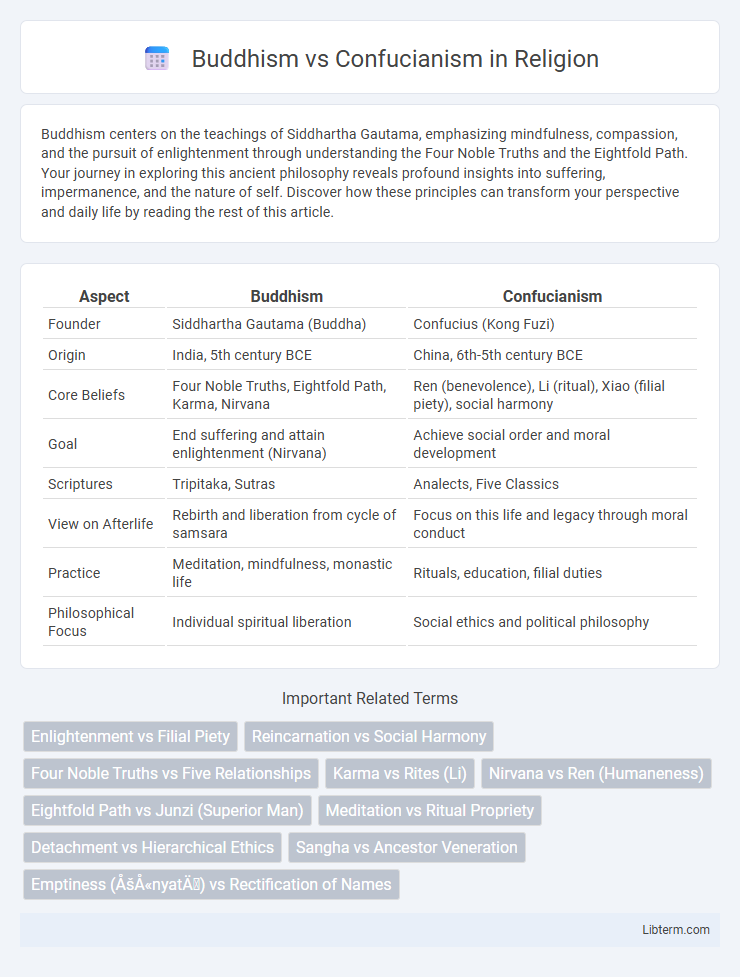Buddhism centers on the teachings of Siddhartha Gautama, emphasizing mindfulness, compassion, and the pursuit of enlightenment through understanding the Four Noble Truths and the Eightfold Path. Your journey in exploring this ancient philosophy reveals profound insights into suffering, impermanence, and the nature of self. Discover how these principles can transform your perspective and daily life by reading the rest of this article.
Table of Comparison
| Aspect | Buddhism | Confucianism |
|---|---|---|
| Founder | Siddhartha Gautama (Buddha) | Confucius (Kong Fuzi) |
| Origin | India, 5th century BCE | China, 6th-5th century BCE |
| Core Beliefs | Four Noble Truths, Eightfold Path, Karma, Nirvana | Ren (benevolence), Li (ritual), Xiao (filial piety), social harmony |
| Goal | End suffering and attain enlightenment (Nirvana) | Achieve social order and moral development |
| Scriptures | Tripitaka, Sutras | Analects, Five Classics |
| View on Afterlife | Rebirth and liberation from cycle of samsara | Focus on this life and legacy through moral conduct |
| Practice | Meditation, mindfulness, monastic life | Rituals, education, filial duties |
| Philosophical Focus | Individual spiritual liberation | Social ethics and political philosophy |
Introduction to Buddhism and Confucianism
Buddhism, founded by Siddhartha Gautama (the Buddha) in the 5th century BCE, centers on the Four Noble Truths and the Eightfold Path as means to attain enlightenment and end suffering. Confucianism, based on the teachings of Confucius in the same era, emphasizes moral virtues, social harmony, and proper conduct in personal and governmental relationships. Both philosophies profoundly shaped East Asian culture but differ in their focus on spiritual liberation versus ethical governance.
Historical Origins and Development
Buddhism originated in the 6th century BCE in northeastern India with the teachings of Siddhartha Gautama, emphasizing enlightenment through meditation and ethical living. Confucianism began in the 5th century BCE in China, founded by Confucius, centering on social harmony, morality, and proper conduct in familial and governmental relationships. Both philosophies shaped East Asian culture, with Buddhism spreading across Asia through monastic networks and Confucianism influencing Chinese political and educational systems for millennia.
Core Beliefs and Philosophies
Buddhism centers on the Four Noble Truths and the Eightfold Path, emphasizing the cessation of suffering through enlightenment (nirvana) and detachment from desires. Confucianism prioritizes social harmony, filial piety, and moral virtues such as righteousness (yi) and benevolence (ren) to cultivate ethical behavior and proper relationships within society. While Buddhism focuses on individual spiritual liberation, Confucianism stresses societal order and ethical governance.
Key Texts and Scriptures
Buddhism's key texts include the Tripitaka, Mahayana Sutras, and Tibetan Book of the Dead, emphasizing teachings on suffering, enlightenment, and compassion. Confucianism centers on the Analects, the Five Classics, and the Doctrine of the Mean, focusing on ethics, social harmony, and proper conduct. These scriptures shape the foundational philosophies and cultural influences unique to each tradition.
Concepts of the Self and Afterlife
Buddhism teaches the concept of anatta, or no-self, emphasizing the impermanent and interconnected nature of existence, with the afterlife involving rebirth influenced by karma until achieving Nirvana. Confucianism centers on the self as defined through social roles, ethics, and filial piety, focusing more on living a moral life in the present rather than an explicit afterlife doctrine. While Buddhism addresses liberation from the cycle of rebirth, Confucianism prioritizes harmony within society and ancestral reverence without a detailed metaphysical focus on life after death.
Moral Ethics and Values
Buddhism emphasizes compassion, mindfulness, and the alleviation of suffering through ethical conduct, promoting the Four Noble Truths and the Eightfold Path as guides for moral behavior. Confucianism centers on social harmony, respect for hierarchy, and filial piety, advocating virtues such as righteousness (yi), benevolence (ren), and proper conduct (li) in human relationships. Both systems shape moral ethics by fostering personal development and societal order, yet Buddhism focuses more on inner enlightenment while Confucianism prioritizes external social duties.
Social Structure and Community Life
Buddhism emphasizes individual spiritual development and liberation through practices like meditation, often encouraging detachment from rigid social hierarchies and fostering monastic communities as centers of spiritual learning. Confucianism prioritizes social harmony through clearly defined hierarchical relationships, such as filial piety and duties within family and state, reinforcing a structured social order that promotes collective well-being and moral conduct. Both systems impact community life by shaping ethical behavior, but Buddhism leans toward personal enlightenment while Confucianism focuses on maintaining social stability and proper roles.
Role of Rituals and Practices
Buddhism emphasizes rituals such as meditation, chanting, and offerings to cultivate mindfulness and spiritual awakening, deeply intertwining practices with personal enlightenment. Confucianism prioritizes rituals like ancestor worship, ceremonial rites, and social rituals that reinforce societal harmony, ethical behavior, and respect for hierarchy. Both traditions use rituals to sustain their core values, but Buddhism's focus is inward spiritual growth, whereas Confucianism centers on external social order and relationships.
Influence on East Asian Cultures
Buddhism profoundly shaped East Asian cultures through its spiritual teachings, influencing art, literature, and ethical practices across China, Japan, and Korea for centuries. Confucianism established social and political frameworks emphasizing hierarchy, filial piety, and education, deeply affecting governance and family structures in these societies. Both philosophies interwove to create a unique cultural synthesis that continues to impact East Asian values and traditions today.
Modern Relevance and Global Impact
Buddhism's emphasis on mindfulness and meditation has gained global traction, influencing mental health practices and stress reduction worldwide. Confucianism shapes contemporary East Asian societies through its focus on social harmony, ethical governance, and educational values, impacting policy and cultural norms. Both traditions contribute to global dialogues on morality, community, and individual well-being, fostering intercultural understanding and ethical frameworks in diverse contexts.
Buddhism Infographic

 libterm.com
libterm.com